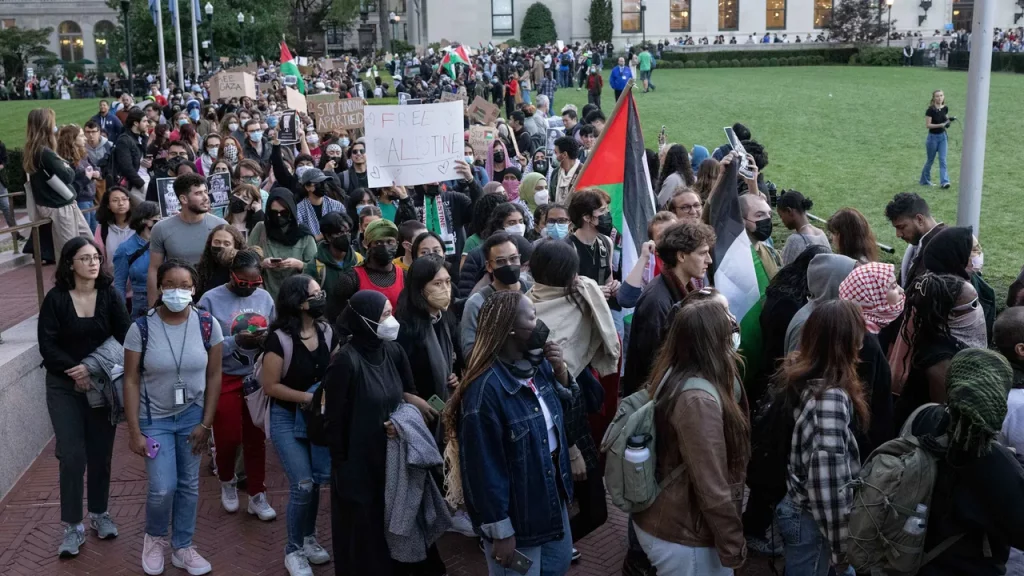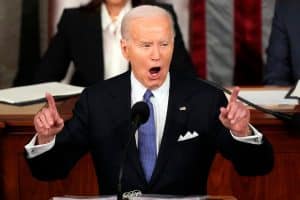On Wednesday, April 3, Columbia University suspended six students, including a Palestinian student and two Jewish students. These suspensions came two nights after students were visited at their homes by private investigators hired by Columbia. The investigators also sent threatening emails to leaders of Columbia University Apartheid Divest (CUAD), a coalition fighting to compel Columbia to divest all its economic and academic stakes from Israeli apartheid. The emails pressured the group to cancel a rally on April 4 for Al-Shifa Hospital, organized with Student Workers of Columbia (SWC). CUAD has also launched a referendum campaign at all schools for student bodies to vote for their institutions to divest.
Tell me a little bit about what happened to you and what’s been going on at Columbia.
OK. So Monday night [April 1], while I was having a meeting in this room, I received a knock on my door. And it was two people who identified themselves as private investigators contracted by Columbia. They told me that they wanted to speak with me. They asked me a series of questions, to which I responded with “no” to every single one, and let them know they needed to reach out to me later.
I found out that they had two more people [other students under investigation] that they had reached out to. We coordinated with two lawyers to give advice. The next morning I got an email from the COO of Columbia saying that I was expected to contact the private investigators by 5 o’clock that day. And if I didn’t, I would receive immediate disciplinary action.
Come to find out, then more people started to receive that email as well. So it started to become known as the Holloway emails. Cass Holloway is the name of the COO. We then drafted a series of emails that we could send out to them and let them know that we have retained counsel. We will not be going in for an interview just because, or whatever, for the investigation. We requested a week to confer with legal counsel and get our bearings that this was a violation of our Fifth Amendment right to self-incrimination as well as the Sixth Amendment right to counsel.
They then spoke with legal counsel, who were then negotiating different times about how the conversations would take place. And legal counsel settled that we are still required to go to the meeting, still required. And at the meeting, we need to have a “meaningful contribution,” which means that we have to answer all of the questions and answer all of their follow-up questions, potentially after the meeting. Otherwise, we would be deemed noncompliant and we would receive an immediate suspension.
Last night [April 3], at around 5 p.m., we got a frantic email in our legal chat saying that we needed to show up by 6 p.m. So within one hour, we need to show up to present ourselves to these private investigators. I believe that this is a ploy because they knew that there was an action tomorrow [April 4]. So they wanted to suspend as many people to prevent people from going to the action and to scare people from going to the action. I made a personal decision, as did other people, that we would not comply.
We understand that even if we do go into this meeting, there’s still the likelihood of us being suspended, that they’re only going to use this to harm us, and that these people are former federal agents. And it completely goes against my morals as an abolitionist, as an abolitionist social worker, and as somebody that personally hates the police and has horrible interactions with the police, that I will never engage with law enforcement, whether that be former or current.
So along with that suspension, I also think to add as well, when the PIs were here, I clarified with them, I said, “Am I under investigation?” They explicitly stated, “No, you are not under investigation. We just need you to help.” Upon being suspended, I received five charges, which I can also send to you as well. Disruptive behavior, endangerment, law violation, university policy violation, and failure to comply. So from what I was told by the PIs up until Wednesday, I was under the impression that I wasn’t under the investigation. And now, come to find out, I’m now being investigated. I’m now being charged. I’m also now being kicked out of my housing. I’m expected to leave by 7:45 tonight [April 4]. We’ll see how that goes.
Why do you think these attacks are happening against the pro-Palestine movement?
The president of Columbia, Minouche Shafik, is meeting with Congress on April 12. And I think that they’re ramping up these efforts because she’s meeting about antisemitism. And I think they’re ramping up these efforts to show Congress that they’re cracking down hard on us, that they’re actually taking this seriously. Prior to this, this antisemitism task force has been a joke and, as we can see, has struggled to even identify what antisemitism means. So I believe they’re trying to use us as examples to push their own agenda to show to Congress, “Oh, look, we’re actually taking this seriously.” I also want to highlight, too, that as the Israeli occupation forces are bombing Rafah, Columbia is likely benefiting financially from this. So I think there is some level of protecting their own interests, their own financial interests, not even just from that, but from their donors and trustees who are Zionists. So any support for Palestine is seen as an attack inherently on Columbia. And all of their investments and financial interests.
Why do you think the attacks at Columbia have been particularly harsh?
No matter where I go within social student circles, when I was in a protest in DC or when I talked to the people in New York, even when I was talking in the Bay Area, people notice what’s going on here. People are saying that Columbia is one of the strongest leaders of this movement on campus. And I think [the administration doesn’t] know what to do with that. Columbia, and I believe this is half the reason why most of us came to Columbia, that they encourage political dissent. They encourage critical thinking. And I think they don’t quite know what that actually means, because now they’re seeing it actually play out. Except instead of being thoughts and theories, this is now being taken into action. And I think they’re not understanding what that is. And I think they’re scared.
Yeah, 100 percent. They don’t want to be made an example of themselves.
Right, so they’re making an example of us.
And how do you think we should fight back against these attacks?
I think that we shouldn’t let this stop us. There might be some more limitations. We might have to take a step back and be more strategic about what we’re doing and how we’re doing it. But I don’t think that should stop us.
I also think there should be a call for people who have been a little bit more reserved in this movement, or have not put much time, thought, energy, or physical space into this movement, to maybe take a step up and look at what they can offer to this movement. I’m not saying that everybody has the privilege of going out to a protest, but really identifying what you can do. Because, as we’re seeing, smaller numbers of people are showing up and getting attacked by Columbia admin or by the NYPD or by former IDF soldiers in a skunk attack. So it really needs to be a larger movement where more people are standing up. And I think that’s the biggest way we can fight repression, because right now it’s just identifying certain folks.
Yeah, there’s a target on the back of the most visible people. How do you think that students can unite to fight back against the repression?
Join CUAD, join Students for Justice in Palestine (SJP), join Columbia School of Social Work for Palestine (CSSW4P). Join Within Our Lifetime (WOL), join the Palestinian Youth Movement (PYM). There are so many movements already there. There are so many options to get involved. We don’t have to reinvent the wheel because the wheel has already been invented. There’s already been a long-standing movement to fight the Israeli occupation, against U.S. involvement in the Israeli occupation of Palestine, but also divestment efforts and student repression on campus. There are organizations that are willing to onboard new people, to train volunteers, to get people involved. And so people need to take advantage of that opportunity and step up.
And what do you think is the role of students and workers in fighting back? For example, the Student Workers of Columbia?
We would not be here in this movement if it wasn’t for the Student Workers of Columbia. Their support has been essential, not just in terms of fighting sanctioned events and supporting us with statements and such, but also the individuals who are stepping up within that committee have been essential to the backbone of this movement on campus. Also just understanding that exploitation takes place in so many different ways. And if we look at Palestine, the exploitation of Palestinians for their land, their blood, for their resources, is the baseline of all exploitation in this world. So if we look at what’s going on in Palestine, we can draw parallels to every single exploitation and oppression in the world.
And do you think that there’s a role of the larger labor movement in fighting for Palestine?
One hundred percent. I mean, not only are our movements connected, but we’re facing severe labor violations. People are being silenced at their workplaces. People are being let go or disciplined at their workplace for standing up, including at Columbia. We have TAs and faculty who are being reprimanded or disciplined for speaking up against Palestine. And this is 100 percent, in my view, a labor issue.
And what do you think are the next steps for the movement for a free Palestine?
We must remain steadfast and organize ourselves against this repression. I think that they’ve gotten very comfortable being in this position that they are. I think they’ve taken a defense. They’ve gone from the defensive to the offensive. And I think we need to amp up what we’re doing, especially before we end our semester.
I think you can take an example out of the, what now, six of us, seven of us, who have gotten suspended in the past 12 hours or 24 hours. Use as an example that if we don’t all step up and ramp up, this will happen to other people. I don’t think we’re gonna free Palestine through our student movements. And that’s something that we have to recognize. But what we are going to contribute to a larger movement that is working to free Palestine. We need to understand that we need to push for divestment; our referendum that has been initiated throughout Columbia as a whole, but also individual colleges and campuses. We need to push for divestment. The student body’s push for divestment in 2020 was ignored by admin. We can’t let that happen again. And there’s very much a possibility that the admin can sign off on something and very much ignore it. So if we really wanna focus as students, the student organizers pushing for divestment, fighting back against repression, I think those are the two strongest things that we can do. And as a larger movement, I think we need to unite with students. And I think this is something that’s been happening and growing, I see more and more of it. But uniting student movements, and but also uniting cities, make this a globalized and nationalized intifada. We don’t say that just to chant it, we mean that. And so how do we actually take “globalize the intifada” from words into actions?
And how do we unite multiple movements against oppression? So like against anti-Black racism, against labor violations, against queer and trans oppression, how do we unite all those struggles?
Pride month’s coming up. I’m looking at the donors’ list for all of these Prides. I mean, corporate pride itself is problematic in so many ways, but then you look a little bit deeper and you see Zionist entities are contributing to Pride. So how do we attack that? How do we remove Zionism from every single aspect of society in which it’s infiltrated? We need to start looking into how Zionism controls our lives, whether or not we’re Palestinian. And of course, the harshest control goes on Palestinians. And so how do we look at where Zionism has affected our lives and our society and how do we get rid of it?
And another thing, they [the private investigators] also showed up to my house at the time that I was supposed to be breaking fast. And I know that another person has the private investigators show up at his house while he was supposed to be breaking fast. They’re showing no regard for religious observations and also showing no trauma-informed care. And also they are clearly targeting people because of affiliation but then completely disregarding their sexual orientation and gender identity as well. So it feels very targeted in many ways. It looks like they’re going after vulnerable populations without any sort of regard for faith or identity.
Yeah, and it does seem like they’re going after like Black, Brown, queer, trans, Arab, and Muslim organizers.
Heavy. It’s like Canary Mission but Columbia Mission. I also want to highlight, too, that Canary Mission is ramping up its CUAD attacks. In the past, well, since Monday, I’ve known three separate CUAD members, two of whom are students at the School of Social Work, who have been added to Canary Mission. So it seems like not only are people that are in support of us are noticing us, but also those who are scared of us are also noticing.
And why do you think that the movement at Columbia has remained so steadfast in its pursuit of divestment?
We have nothing to lose but our chains. I think a lot of us were fed wonderful stories about this institution, which is maybe why some of us accept it, which is why I accepted that we are so progressive, that we love political discourse, we love all of these things, and come to find out that they’re cracking down harshly on us. And I think the stark contrast between the two has given us no other option but to be militant. I look at this kind of the same way I look at crime. People are like, OK, this person is stealing. Well, why is this person stealing? Because they have no other option. Why is our student body being so militant? Well, because they have no other option. We’re being silenced, we’re being attacked. Our physical and mental health are in jeopardy as well as communities thousands of miles away from us that we care about so deeply.
Is there anything else that you feel like I missed that you wanna discuss or wanna talk about?
Cass Holloway, Dean Begg, and Columbia University, stop attacking your students! Free Palestine!











